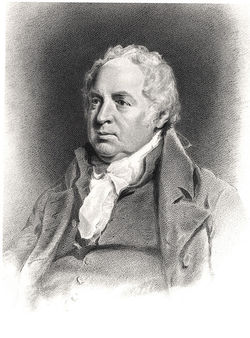Annotation:Poor Soldier (1) (The): Difference between revisions
No edit summary |
Alan Snyder (talk | contribs) (Fix HTML, citation) |
||
| Line 1: | Line 1: | ||
=='''Back to [[{{BASEPAGENAME}}]]'''== | =='''Back to [[{{BASEPAGENAME}}]]'''== | ||
---- | ---- | ||
[[File:Shield.jpg|250px|thumb|right|William Shield]] | |||
<p><font face="garamond, serif" size="4"> | <p><font face="garamond, serif" size="4"> | ||
'''POOR SOLDIER [1], THE.''' English, Jig. England, Dorset. D Major. Standard tuning (fiddle). One part. '''The Poor Soldier''' [https://en.wikipedia.org/wiki/The_Poor_Soldier] (1763) is the name of a two-act comic opera that was immensely popular in Britain, Ireland, and even the United States. The play was by John O’Keefe [https://en.wikipedia.org/wiki/John_O'Keeffe_%28Irish_writer%29] ( | '''POOR SOLDIER [1], THE.''' English, Jig. England, Dorset. D Major. Standard tuning (fiddle). One part. '''The Poor Soldier''' [https://en.wikipedia.org/wiki/The_Poor_Soldier] (1763) is the name of a two-act comic opera that was immensely popular in Britain, Ireland, and even the United States. The play was by John O’Keefe [https://en.wikipedia.org/wiki/John_O'Keeffe_%28Irish_writer%29] (1747–1833), but music was composed and arranged by violinist, violist and the successful composer William Shield [https://en.wikipedia.org/wiki/William_Shield] (1748–1829). Shield, like many composers for stage of his era, freely borrowed from folk repertory for many of his melodies. | ||
The finale of the work showcases a tune by the blind Irish harper Turlough O’Carolan ( | The finale of the work showcases a tune by the blind Irish harper Turlough O’Carolan (1670–1738), “[[John O'Connor]]” (“Planxty Mrs. O’Conor”). An early publication of the tune appears in 1799 by Thomas Calvert, a musician from Kelso, Scotland. A note with his collection states that Calvert supplied “a variety of music and instruments, instruments lent out, tun’d and repaired.” | ||
<br> | <br> | ||
<br> | <br> | ||
| Line 13: | Line 14: | ||
</font></p> | </font></p> | ||
<p><font face="garamond, serif" size="4"> | <p><font face="garamond, serif" size="4"> | ||
''Printed sources'': Trim ('''Musical | ''Printed sources'': Trim ('''The Musical Heritage of Thomas Hardy'''), 1990; No. 93. | ||
<br> | <br> | ||
<br> | <br> | ||
| Line 21: | Line 22: | ||
</font></p> | </font></p> | ||
<br> | <br> | ||
<br> | <br style="clear:both"/> | ||
---- | ---- | ||
=='''Back to [[{{BASEPAGENAME}}]]'''== | =='''Back to [[{{BASEPAGENAME}}]]'''== | ||
Revision as of 02:04, 25 January 2017
Back to Poor Soldier (1) (The)

POOR SOLDIER [1], THE. English, Jig. England, Dorset. D Major. Standard tuning (fiddle). One part. The Poor Soldier [1] (1763) is the name of a two-act comic opera that was immensely popular in Britain, Ireland, and even the United States. The play was by John O’Keefe [2] (1747–1833), but music was composed and arranged by violinist, violist and the successful composer William Shield [3] (1748–1829). Shield, like many composers for stage of his era, freely borrowed from folk repertory for many of his melodies.
The finale of the work showcases a tune by the blind Irish harper Turlough O’Carolan (1670–1738), “John O'Connor” (“Planxty Mrs. O’Conor”). An early publication of the tune appears in 1799 by Thomas Calvert, a musician from Kelso, Scotland. A note with his collection states that Calvert supplied “a variety of music and instruments, instruments lent out, tun’d and repaired.”
Source for notated version:
Printed sources: Trim (The Musical Heritage of Thomas Hardy), 1990; No. 93.
Recorded sources:
